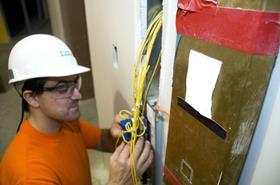Committee calls on government to set higher competence requirements for electricians

A committee of MPs has called for greater competence checks on electricians carrying out work covered by Part P of building regulations.
The Communities and Local Government Committee urged government to set higher competence requirements for electricians carrying out work under Part P, which covers the riskiest electrical work.
In a report published today the committee recognises Part P has “improved” the quality of domestic electrical work, but added “much more needs to be done to protect people in their homes”.
The report also calls on government to increase the public’s awareness of Part P and calls for more proactive enforcement against those who breach it.
Clive Betts MP, chair of the Communities and Local Government Committee, said: “Under the current competent persons scheme the person actually carrying out the work in people’s homes does not have to be competent. Somebody whose only electrical qualification is that they have attended a five week training course simply should not be re-wiring houses.
“Yet this is what we were told is happening.
“The person in the home wants to know that the person arriving on the doorstep is a qualified electrician. The current system does not guarantee this. Rather, it can brand the incompetent as competent.
“Under the system as it stands the incompetent electrician has their work checked by a qualified supervisor. But we heard of some supervisors supervising over 3,000 notifiable pieces of work a year. I question whether they can adequately check work with such large caseloads.
“Under the changes we propose people would know that the electrician working in their home is qualified. If, as scheme operators told us, standards of electricians are already high, then the added criteria will not be too onerous.
“During the five-year transition there should be an annual limit—agreed by the industry—on the maximum number of transactions that a single qualified supervisor can review. This will increase the chance that in the interim unqualified electricians will at least be having their work properly checked by a qualified supervisor.”



























1 Readers' comment